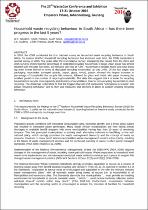 ResearchSpace
ResearchSpace
Household waste recycling behaviour in South Africa - has there been progress in the last 5 years?
JavaScript is disabled for your browser. Some features of this site may not work without it.
- ResearchSpace
- →
- Research Publications/Outputs
- →
- Conference Publications
- →
- View Item
| dc.contributor.author |
Strydom, Wilma F

|
|
| dc.contributor.author |
Godfrey, Linda K

|
|
| dc.date.accessioned | 2017-07-28T09:01:43Z | |
| dc.date.available | 2017-07-28T09:01:43Z | |
| dc.date.issued | 2016-10 | |
| dc.identifier.citation | Strydom, W.F. and Godfrey, L.K. 2016. Household waste recycling behaviour in South Africa - has there been progress in the last 5 years? The 23rd WasteCon Conference and Exhibition, 17-21 October 2016, Emperors Palace, Johannesburg | en_US |
| dc.identifier.uri | http://hdl.handle.net/10204/9333 | |
| dc.description | The 23rd WasteCon Conference and Exhibition, 17-21 October 2016, Emperors Palace, Johannesburg | en_US |
| dc.description.abstract | In 2010, the CSIR conducted the first national survey on household waste recycling behaviour in South Africa. To assess whether household recycling behaviour has improved over time, the CSIR conducted a second survey in 2015, five years after the first national survey. Comparing the results from the 2010 and 2015 surveys shows that the percentage of dedicated recycling households in large urban areas has almost doubled over the past five years, but remains very low at 7.2%. Households in smaller towns and rural areas lag even further behind in terms of dedicated recycling households, at only 2.6%. Of the four paper and packaging recyclables surveyed (plastic, paper, glass, metal), plastic showed the largest increase in percentage of households that recycle this material, followed by glass and metal, with paper showing the smallest growth in the number of recycling households. The data also suggest that it is easier for recycling households to recycle more (quantity and diversity of recyclables), than for non-recycling households to start recycling. The challenge is therefore to find the triggers that will shift consumers “willingness to recycle” into actual “recycling behaviour” and to then put measures and services in place to support ongoing recycling behaviour. | en_US |
| dc.language.iso | en | en_US |
| dc.relation.ispartofseries | Worklist;18308 | |
| dc.subject | Household waste recycling | en_US |
| dc.subject | South African waste recycling behaviour | en_US |
| dc.subject | Recycling behaviours | en_US |
| dc.title | Household waste recycling behaviour in South Africa - has there been progress in the last 5 years? | en_US |
| dc.type | Conference Presentation | en_US |
| dc.identifier.apacitation | Strydom, W. F., & Godfrey, L. K. (2016). Household waste recycling behaviour in South Africa - has there been progress in the last 5 years?. http://hdl.handle.net/10204/9333 | en_ZA |
| dc.identifier.chicagocitation | Strydom, Wilma F, and Linda K Godfrey. "Household waste recycling behaviour in South Africa - has there been progress in the last 5 years?." (2016): http://hdl.handle.net/10204/9333 | en_ZA |
| dc.identifier.vancouvercitation | Strydom WF, Godfrey LK, Household waste recycling behaviour in South Africa - has there been progress in the last 5 years?; 2016. http://hdl.handle.net/10204/9333 . | en_ZA |
| dc.identifier.ris | TY - Conference Presentation AU - Strydom, Wilma F AU - Godfrey, Linda K AB - In 2010, the CSIR conducted the first national survey on household waste recycling behaviour in South Africa. To assess whether household recycling behaviour has improved over time, the CSIR conducted a second survey in 2015, five years after the first national survey. Comparing the results from the 2010 and 2015 surveys shows that the percentage of dedicated recycling households in large urban areas has almost doubled over the past five years, but remains very low at 7.2%. Households in smaller towns and rural areas lag even further behind in terms of dedicated recycling households, at only 2.6%. Of the four paper and packaging recyclables surveyed (plastic, paper, glass, metal), plastic showed the largest increase in percentage of households that recycle this material, followed by glass and metal, with paper showing the smallest growth in the number of recycling households. The data also suggest that it is easier for recycling households to recycle more (quantity and diversity of recyclables), than for non-recycling households to start recycling. The challenge is therefore to find the triggers that will shift consumers “willingness to recycle” into actual “recycling behaviour” and to then put measures and services in place to support ongoing recycling behaviour. DA - 2016-10 DB - ResearchSpace DP - CSIR KW - Household waste recycling KW - South African waste recycling behaviour KW - Recycling behaviours LK - https://researchspace.csir.co.za PY - 2016 T1 - Household waste recycling behaviour in South Africa - has there been progress in the last 5 years? TI - Household waste recycling behaviour in South Africa - has there been progress in the last 5 years? UR - http://hdl.handle.net/10204/9333 ER - | en_ZA |





